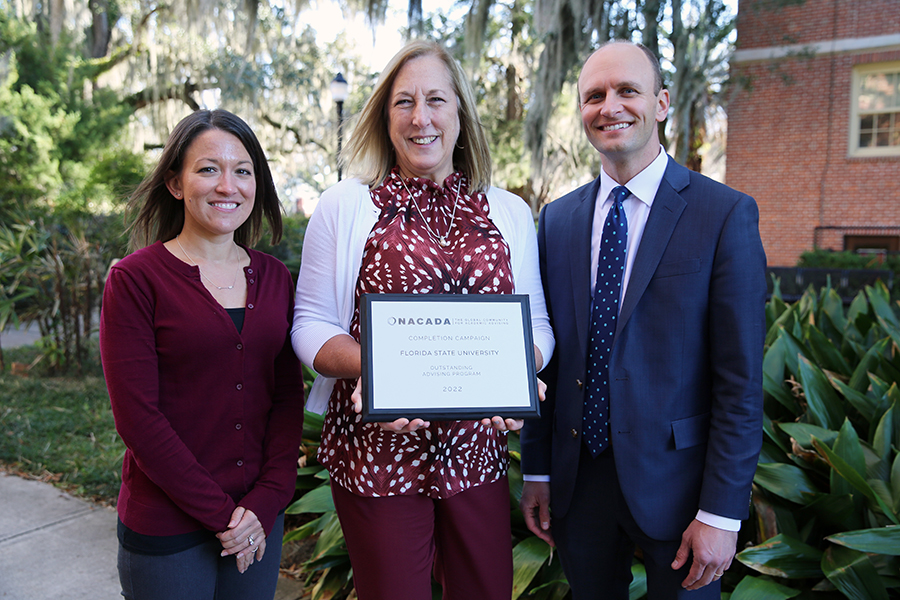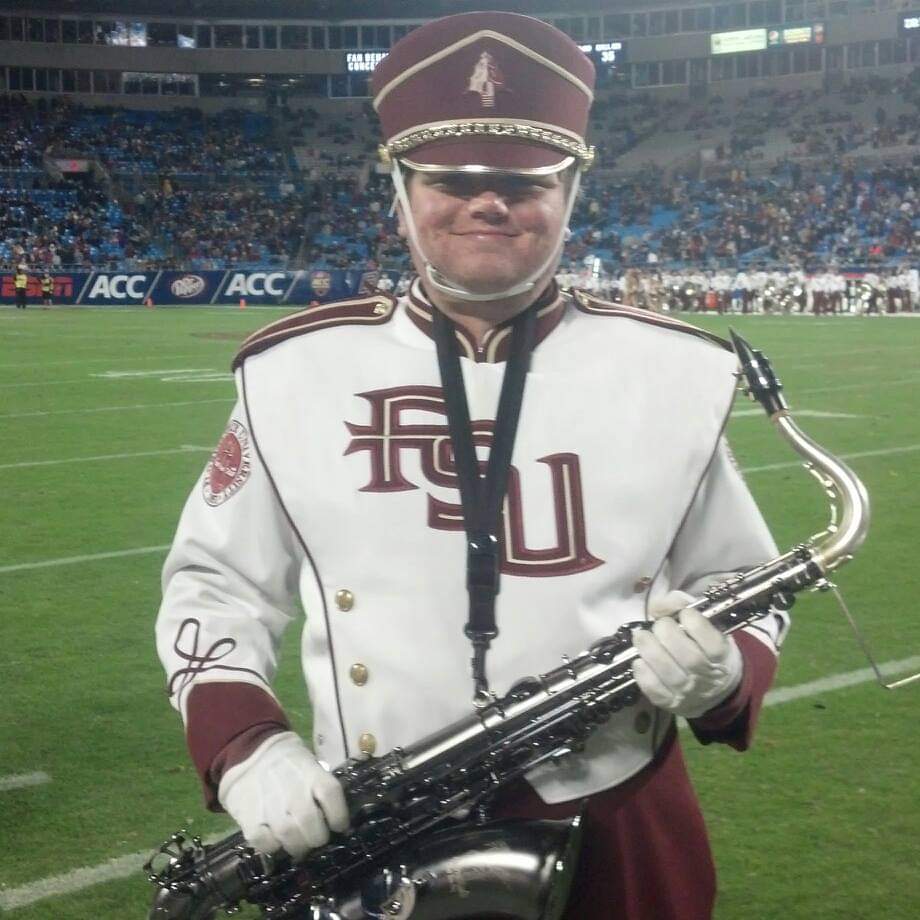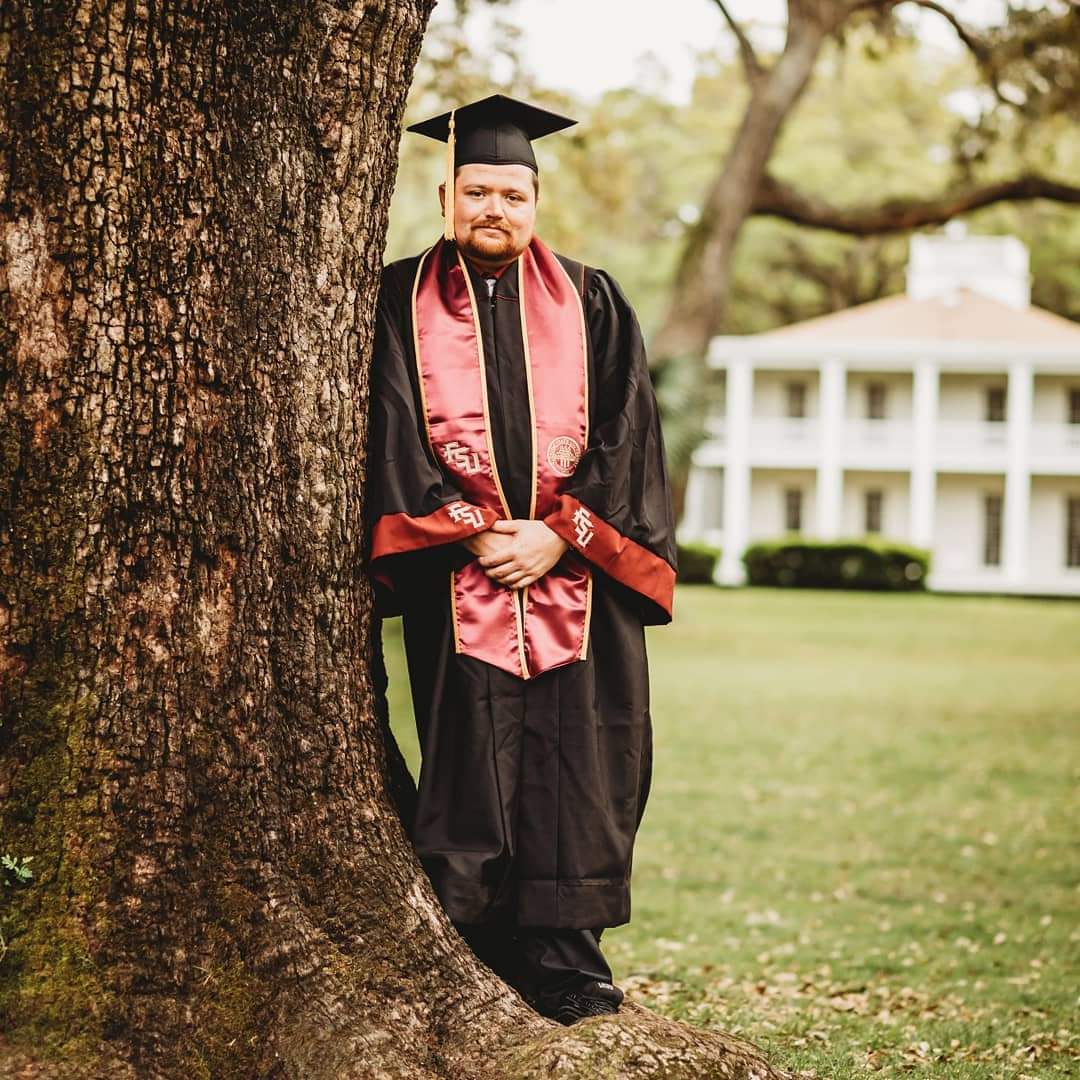
Andrew Roberts came to Florida State University in 2013 and started out strong, but a tragic turn of events thrust him into a years-long journey to complete his degree.
He credits one key university office, and the steady, devoted guidance from a hands-on graduation specialist, for encouraging him to cross the finish line and finally graduate, which he ultimately accomplished Spring 2021.
“There was somebody else out there that cared, that wanted to see me succeed,” Roberts said.
Through completion campaign programming, the Graduation Planning and Strategies Office, or GPS, works one-on-one with academically inactive seniors to help them come back to school and, ultimately, earn a diploma.
“FSU’s completion campaign has become a model for the nation in how to care for students and see them through to graduation no matter how long it takes.”
— Joe O’Shea, associate provost and dean of the Division of Undergraduate Studies
A dedicated graduation specialist approaches each case differently, with personal outreach and a plan tailored to each student’s unique situation.
The completion campaign, one of multiple initiatives run out of GPS, started five years ago, and was recently recognized as the 2022 Outstanding Advising Program Award winner by the National Academic Advising Association, NACADA.
“FSU’s completion campaign has become a model for the nation in how to care for students and see them through to graduation no matter how long it takes,” said Joe O’Shea, associate provost and dean of the Division of Undergraduate Studies.
Since the Spring 2017 semester, 2,573 students of the 4,251 identified through the completion campaign have gone on to earn their bachelor’s degrees. The current active list contains 1,033 students, which includes those who have already reenrolled at the university or are participating in conversations about doing so.
The completion campaign has improved graduation efficiency at FSU, and in turn, saved millions of dollars for state taxpayers. The initiative won a Florida TaxWatch Productivity Award in 2019 for its efforts.
THE IMPORTANCE OF LISTENING
Students in good standing may find themselves discontinuing their education for a number of reasons, including academic roadblocks, career indecisiveness, financial uncertainty, family obligations, mental health or health challenges. No two cases are the same.
To support such students in reaching the graduation finish line, administrators say you must first listen to their stories.

“A transcript may introduce assumptions about why a student discontinues their enrollment, but it doesn’t tell the whole story,” said Jill Flees, the director for the GPS Office. “Contacting a student directly creates a space for them to share, on their own time and in their own terms, what factors led to their decision.”
That’s just what graduation specialist Lynn Helton did for Roberts, and what she found was a bright student who had experienced a significant trauma and was uncertain about his future.
Roberts had graduated high school with a 4.2 GPA. He had a Bright Futures Scholarship. He played tenor saxophone in the Marching Chiefs and performed at the national championship game at the Rose Bowl against Auburn University in 2014.
But everything changed one early November morning during his sophomore year.
Roberts was an innocent bystander in a public shooting. He was unharmed but sheltered with others in terror, before police escorted them to safety. In the days, weeks, and months after the traumatic incident, he was overwhelmed with fear and didn’t want to leave his apartment.
“I wasn’t able to defend myself or defend my friends,” he said. “I no longer felt safe.”
His GPA dropped; he transferred to the Panama City campus to be closer to home; he changed his major multiple times; he took on jobs in the restaurant industry and questioned whether he needed a college degree.
“I was at a weird place in my life,” Roberts said. “I was comparing myself to others because I hadn’t met certain timelines that society says I should be on.”
In the summer of 2018, his case landed on Helton’s desk. Her job is to follow up with students who have discontinued their education after completing at least 100 credit hours. Shaping a plan for degree completion may include something outside of returning to campus, such as online coursework, enrollment as a transient student at another school or taking a College-Level Examination Program (CLEP) test for those last few required hours of credit.
Helton helped Roberts get through his final requirements for his degree in recreation, tourism and events, including fieldwork at a catering company in Fall 2019.
“I probably would not have graduated if it wasn’t for Ms. Lynn,” Roberts said. “She said: ‘You’re one class away. Get the piece of paper. You’ve done all this work. Get it done.’”
Helton was “strong, motherly, nice, caring,” he said. She called him every other week for a while. His first internship – at Disney – fell through because of the pandemic, just another unexpected stumbling block for Roberts.
Helton and his professor Donna Trafford, at the Panama City campus, helped him instead arrange an internship through the Seagrove Village MarketCafé, in Seagrove Beach, where he could work as a manager while earning college credit.
“Lynn called every two weeks making sure I was turning in paperwork,” Roberts said. She was not going to let him come that far – and work that hard – without making sure he got the credit he deserved.
Helton helped him navigate both the logistical minutia of paperwork and getting where he needed to be and the bigger picture of processing what he had been through and how to accept that he was on a nontraditional path. At times, it was hard for him to see why he needed a college degree while his career in restaurants was thriving.
“After walking away from academics, Andrew was growing a great reputation in the service industry but was still on a bit of an emotional roller coaster for some time,” Helton said. “Those initial conversations were tough. He confessed, ‘I just don’t think this is for me. I don’t even think this degree is important.’ While our early conversations started out quite negative, with persistence on my part and Andrew’s ultimate willingness to overcome his resistance, we were able to reach his graduation success together.”
The GPS Office and its completion campaign can fly under the radar on campus, and that’s partly by design.
“A lot of what we do is behind the scenes,” said GPS director Flees. “That’s intentional, as students trust us with their stories, which at times can be very sensitive and personal.”
The Outstanding Advising Program Award, won in October, was a chance to recognize and celebrate all the work that gets done in the office and as a collaboration with other campus partners, including those in the registrar’s office and various academic deans’ offices.
The College of Social Sciences and Public Policy, for example, sees the work from the GPS Office as complementary to what they do internally within the college to follow up with students who are at risk of not graduating or who didn’t complete requirements during a previous semester.
“GPS’ outreach campaigns help coordinate getting students re-enrolled, meeting with advisers, and working with us to understand their requirements,” said William Hogan, assistant director of academic affairs for the college. “It’s especially helpful when students have disengaged because of some negative life circumstance, and when they get back in touch with us, we are able to work with them to address the resulting academic issues that impact degree completion.”
GRADUATION: A GREAT RELIEF

After Roberts finally crossed the stage to receive his diploma in Spring 2021, he was overcome with what he described as “relief” and “a burden lifted.”
Helton knows that burden is common among those she serves.
“Many of these students express frustration, shame, or confusion as to how to move forward,” Helton said. “Not finishing their degree weighs heavy on them and they’re so appreciative of somebody just taking the time to call, listen, ask questions, and brainstorm solutions.”
Solutions that have worked now for more than 2,500 students, with more on the way.
“I’m grateful to the incredible people across campus who contribute to the completion campaign, especially graduation specialist Lynn Helton,” O’Shea said. “Through her consistent, tailored support, she has been able to improve the lives of so many students and families, a reflection of FSU’s commitment to its community.”
For more information on the Graduation and Planning Strategies Office, visit https://gps.fsu.edu/.



